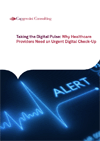 Digital technologies are altering the very fabric of the traditional healthcare delivery model. Consumers are actively embracing digital tools to take charge of their health. Consider this: no less than 86% of respondents in a survey reported that they wanted to take a more proactive role in their healthcare decisions, and 76% reported that they have the tools and information to do so.
Digital technologies are altering the very fabric of the traditional healthcare delivery model. Consumers are actively embracing digital tools to take charge of their health. Consider this: no less than 86% of respondents in a survey reported that they wanted to take a more proactive role in their healthcare decisions, and 76% reported that they have the tools and information to do so.
Social media and mobile platforms are becoming increasingly important channels for consumers. A survey found that 45% of respondents search for health information and close to 34% ask for health-related advice on social media channels. The four million mobile health app downloads that occur every day also give consumers an easy way to track their health. And this development is driving leading device vendors, such as Apple and Samsung, into the digital health tracking market.
Where does this leave the traditional healthcare industry? There is renewed pressure on healthcare providers to not only engage with consumers through new digital channels, but also to recognize and act on the opportunities that digital technologies present. For instance, digital technologies can dramatically transform chronic disease management, by allowing doctors to monitor patients remotely. Wearable digital trackers enable consumers to participate in what is increasingly being known as the quantified self age.
Download: Taking the Digital Pulse: Why Healthcare Providers Need an Urgent Digital Check-Up (.pdf, 3.716 KB).
Download from eHealthNews.eu Portal's mirror: Taking the Digital Pulse: Why Healthcare Providers Need an Urgent Digital Check-Up (.pdf, 3.716 KB).